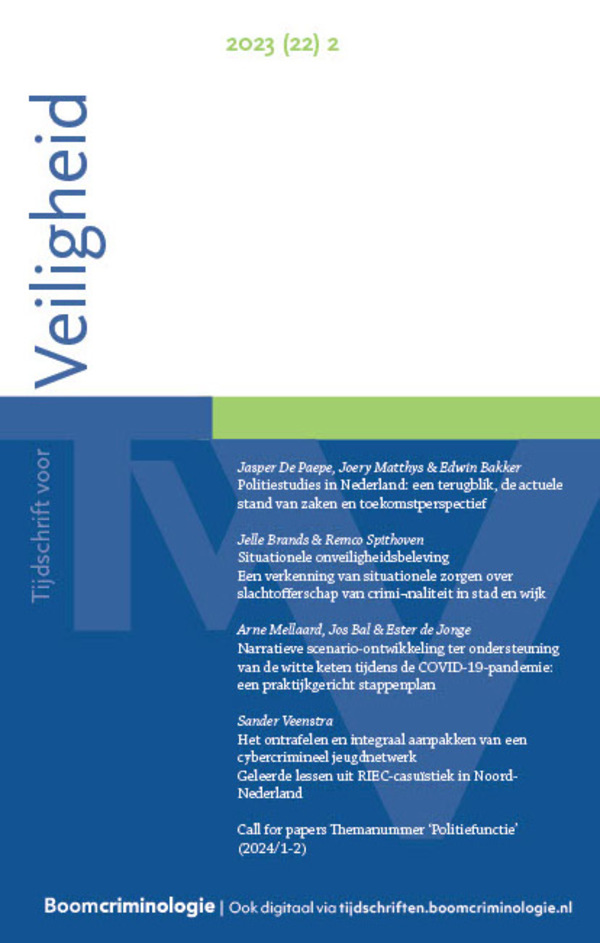|
A number of authors claim that the Dutch government is using the words safety and security more often and more broadly. In this article we show that this is partly true. By studying the usage of the word safety in the Dutch queen’s speeches, we see that especially from 1999 onwards the speeches do contain more references to safety and security issues. Moreover, more and more topics are defined as a safety and security issue. However, this same study shows that a decline in the use of the words safety and security can be discerned from 2006 onwards. Ideas to understand these fluctuations are presented at the end of the article. |


Tijdschrift voor Veiligheid
Over dit tijdschriftMeld u zich hier aan voor de attendering op dit tijdschrift zodat u direct een mail ontvangt als er een nieuw digitaal nummer is verschenen en u de artikelen online kunt lezen.
| Artikel |
VeiligheidEen almaar uitdijend concept |
| Trefwoorden | problem definition, safety, security, queen’s speeches |
| Auteurs | Sandra Resodihardjo en Anne Kors-Walraven |
| SamenvattingAuteursinformatie |
| Artikel |
De preventieve inzet van het tijdelijk huisverbod bij dreigend huiselijk geweld |
| Trefwoorden | domestic violence, temporary restraining order, domestic violence risk, prevention, assessment |
| Auteurs | Leontien M. van der Knaap |
| SamenvattingAuteursinformatie |
|
On January 1, 2009 the Temporary Restraining Order Act entered into force allowing mayors to impose a ten-day restraining order on potential perpetrators of domestic violence. This restraining order, which may be extended to 28 days, prohibits the perpetrator from entering his or her house as well as from contacting the persons staying behind in the home (partner, children, or other members of the household). In order to impose a temporary restraining order, risk factors relating to the perpetrator, the incident, and the family have to be assessed using a domestic violence risk assessment tool (RiHG).The immediate cause to introduce the Act was to enable mayors to take action in situations that, before, would not have given police just cause to intervene because no offences had (yet) been committed. However, evaluations show that temporary restraining orders are mainly imposed in conjunction with criminal proceedings. Yet, researchers suggest that the temporary restraining order may be imposed as a truly preventive measure in a large amount of situations that until now have not been considered (for instance, situations that have not escalated into physical violence). This article examines whether such preventive restraining orders exist within a sample of imposed orders and if so, what characteristics they share.Results show that truly preventive restraining orders are extremely rare. Closer inspection of cases that according to the available risk assessment were not notably violent showed that most of these cases could not be regarded as cases of truly preventive restraining orders. The discussion of the article focuses on the implications of these results for the suggestion that a large number of situations could be suitable for imposing a preventive restraining order. |
| Artikel |
Bijzonder optreden bij openbare ordehandhaving |
| Trefwoorden | governance, street-level-bureaucracy, exemplary urban practitioners, role models, preventive safety strategy in urban disorder |
| Auteurs | Ton van der Pennen |
| SamenvattingAuteursinformatie |
|
This article is based on a research in which we are looking for exemplary urban professionals who seem to be successful in pursuing the social goals they set together with their partners. In urban disadvantaged neighbourhoods, it is not always the standard procedure that gets things done. In the Netherlands decades of urban renewal in its various forms have not solved problems permanently. This does not mean that success is never attained. What seems to have helped in some cases is the presence of a type of practitioner who goes beyond standard procedure. These are professionals, as the ‘casting cop’ we introduce in this article, who do not give up and who are able to succeed where others have failed. Most likely these are experienced practitioners who learned how to cope. Most likely they are actors who inspire others.What we ask is how these practitioners in urban districts do their job in controversial, politically sensitive policy processes that might develop in unintended and surprising ways. In other words we have as a central question: through what ways of working and relating do exemplary urban practitioner (try to) get things done?The professionals we call exemplary are not always taking the common routes to realize their goals. They will not automatically follow the routines of problem solving and because of that they can make a difference. They are critical about mainstream practices and try to find solutions starting from the perspectives of citizens. When we talk about ‘ways of working and relating’ we refer to the qualities these professionals put to use in the planning and decision making processes of urban renewal. It has to do with personal qualities like attitude and experience, but also with strategic skills such as networking with policy partners. ‘Getting things done’ means solving problems or better stated exploiting opportunities. More broadly is their aim to transform what is called ‘urban problem districts’ into ‘livable neighborhoods’. |
| Boekbespreking |
‘Over pedoseksuelen gesproken’ leest als psychologische thriller |
| Auteurs | Annemarie ten Boom en Stefan Bogaerts |
| Auteursinformatie |
